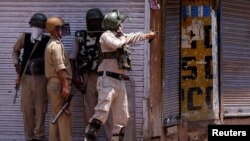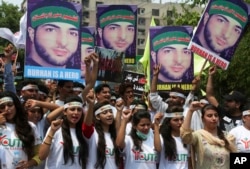Thousands of troops patrolled Indian Kashmir on Saturday as authorities imposed widespread restrictions to foil protests planned for the anniversary of a local militant leader, Burhan Wani, whose killing in 2016 by armed forces has pulled the Himalayan region into a fresh spiral of violence after several years of relative peace.
Internet services were shut down and police raised barricades between neighborhoods. Shops and businesses remained closed in the Kashmiri capital, Srinagar.
Police fired tear gas in at least four places where protesters attempted to march in the streets.
The tightest security was in Tral village around the house of Wani, who had joined the Hizbul Mujahideen militant group and is regarded as a hero in Kashmir. He belonged to a new rank of social media savvy young rebels who used Facebook and other social media to draw fresh recruits.
The call for a strike to mark Wani’s killing was given by local Kashmiri separatist leaders and by a Pakistan-based militant commander, Syed Salahuddin, whom the United States last week added to its list of global terrorists.
Violent protests
Kashmir has been restive ever since widespread violent street protests that erupted after his killing.
“The mood is defiance, not much has changed in the past one year since his killing,” said Shujaat Bukhari, editor of Rising Kashmir newspaper. Calling Wani a “trigger” for a situation that had been simmering for a long time, Bukhari said “He became a rallying point, in a way he united Kashmiris in their anger and angst against the Indian state.”
The present round of unrest in India’s only Muslim majority region has shattered a long spell of relative calm that Kashmir witnessed following a violent separatist insurgency in the 1990s.
And this time, civilians are playing a greater role in the unrest. Many young students are taking part in street protests, where crowds pelting stones often target security forces. Officials estimate that about 100 local youth have joined the ranks of militants, and in villages it is not uncommon for people to resist counter militancy operations.
Lacking 'political engagement'
Analysts say New Delhi’s failure to engage in a political dialogue in the region is fanning the anti-India sentiment.
“The continuous absence of political engagement in Kashmir and the continuous denial on part of Delhi that says there is nothing to be addressed politically has made the situation more complex in the past one year,” according to Bukhari.
India blames Pakistan-based militant groups for stoking the unrest in Kashmir. Pakistan denies the allegation.
Meanwhile, Indian officials said two civilians were killed and two children were wounded by gunfire from Pakistani troops along the line of control that divides the region between the two countries.
Even as the situation in Kashmir has deteriorated, cross-border shelling between Indian and Pakistani troops also has become more intense, with each side accusing the other of violating a mutual cease-fire.





